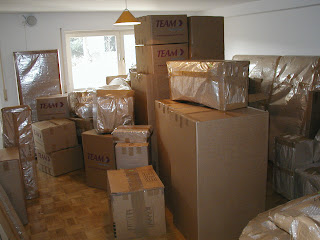It has the feeling of being abandon on an island and forced to survive upon 5lbs of baby food tucked deep within the luggage. It was a sobering moment for me personally and professionally. I came to the stark realization that my company knows nothing of expats and their family. They wrongly figure you'll get in, and get settled, just like any German family. In some ways, they had pushed us into an uncomfortable emotional state and we had to rise to the occassion.
Later that night Chris, a manager from the German office, called to see how we were settling in. I kept my composure during the call while all my emotional strength was focused on screaming. My wife had stopped crying and finally had fallen asleep. Chris told me of a local pizza parlor nearby and I found an ATM machine along the way. I'd been in town only 5 hrs and I'd gained a new appreciation of expat life.
You have about 10-14 days before that 'vacation' feeling will start to fade for your spouse. That odd time when things stop feeling so abstract and you must figure out basic tasks (apartment hunting, bus routes, grocery shopping) for yourself. This part can get really bothersome and frightful for your spouse, while you sit 9 hrs a day at the office.
The time for sitting around has passed and now you must start entering the German society with all it's rules, customs, and patterns. You and your spouse will have to move outside your comfort zone and start asking questions, start testing boundries of comfort, and start making a full effort at acclimation.
You need to get your spouse involved in daily activity. Any activity that sets a routine and adds a level of purpose for each day. All too often, the spouse has no other activity or support group and they are left feeling bored, angry, or resentful. You need to help your spouse with this transition and give them a push out the door. It's unlikely they will do it for themselves as it can look/fee to intimidating.
A 1989 study by the Journal of Management, attempts to draw a connection between the capacity of an overseas expat manager and the ability for his/her spouse to acclimate to the new life. Additionally, the adjustment of the manager is directly coorelated to the adjustment of the spouse. It ain't all about the work!
Start here and start quickly. Direct your spouse into:
-Search out local expat support groups
-Bring your collegues over for dinner with their spouses
-Look for clubs/activities for the kids
-Publish a blog on the experiences

